Old Testament
Genesis Exodus Leviticus Numbers Deuteronomy Joshua Judges Ruth 1 Samuel 2 Samuel 1 Kings 2 Kings 1 Chronicles 2 Chronicles Ezra Nehemiah Esther Job Psalms Proverbs Ecclesiastes Song of Solomon Isaiah Jeremiah Lamentations Ezekiel Daniel Hosea Joel Amos Obadiah Jonah Micah Nahum Habakkuk Zephaniah Haggai Zechariah Malachi1 Corinthians 8:10 Similar Verses
1 Corinthians 8:10 Cross References
For if any man see thee which hast knowledge sit at meat in the idol's temple, shall not the conscience of him which is weak be emboldened to eat those things which are offered to idols;
Uncover the Rich Themes and Topics of This Bible Verse
Listed below are the Bible themes associated with 1 Corinthians 8:10. We invite you to explore each theme to gain deeper insights into the Scriptures.
1 Corinthians 8:10 Cross Reference Verses
This section features a detailed cross-reference designed to enrich your understanding of the Scriptures. Below, you will find carefully selected verses that echo the themes and teachings related to 1 Corinthians 8:10 KJV. Click on any image to explore detailed analyses of related Bible verses and uncover deeper theological insights.
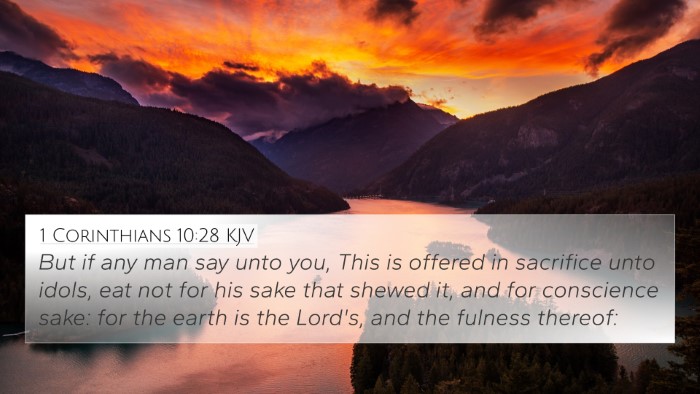
1 Corinthians 10:28 (KJV) »
But if any man say unto you, This is offered in sacrifice unto idols, eat not for his sake that shewed it, and for conscience sake: for the earth is the Lord's, and the fulness thereof:
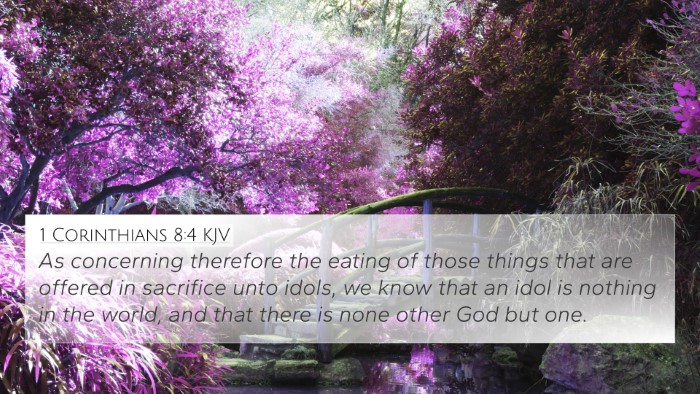
1 Corinthians 8:4 (KJV) »
As concerning therefore the eating of those things that are offered in sacrifice unto idols, we know that an idol is nothing in the world, and that there is none other God but one.

1 Corinthians 10:20 (KJV) »
But I say, that the things which the Gentiles sacrifice, they sacrifice to devils, and not to God: and I would not that ye should have fellowship with devils.

Romans 14:23 (KJV) »
And he that doubteth is damned if he eat, because he eateth not of faith: for whatsoever is not of faith is sin.
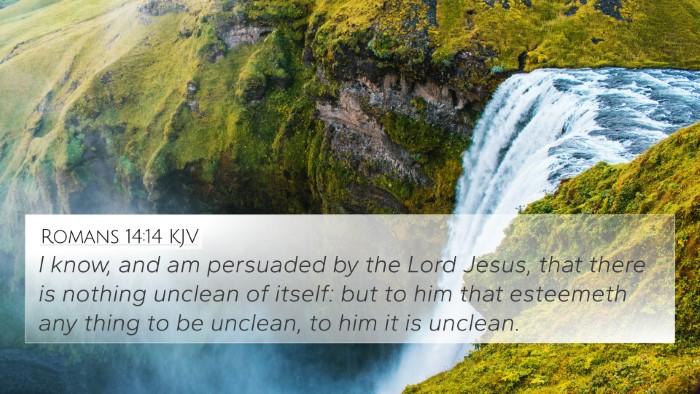
Romans 14:14 (KJV) »
I know, and am persuaded by the Lord Jesus, that there is nothing unclean of itself: but to him that esteemeth any thing to be unclean, to him it is unclean.
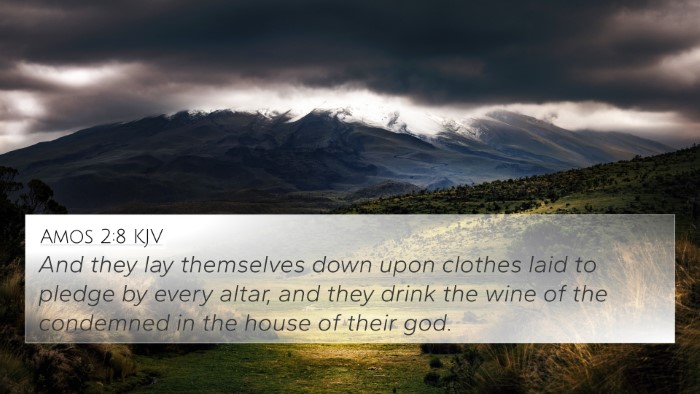
Amos 2:8 (KJV) »
And they lay themselves down upon clothes laid to pledge by every altar, and they drink the wine of the condemned in the house of their god.

1 Corinthians 8:1 (KJV) »
Now as touching things offered unto idols, we know that we all have knowledge. Knowledge puffeth up, but charity edifieth.
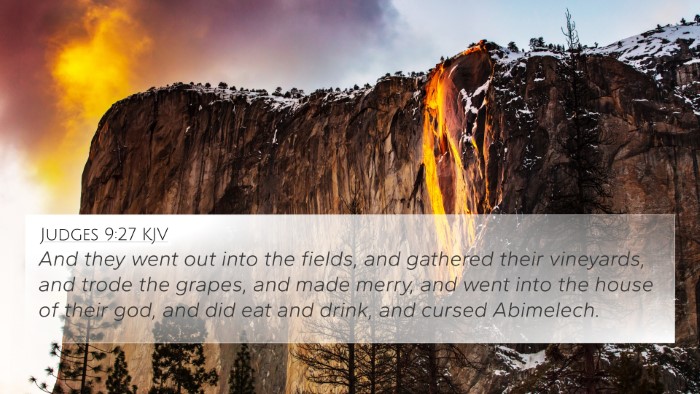
Judges 9:27 (KJV) »
And they went out into the fields, and gathered their vineyards, and trode the grapes, and made merry, and went into the house of their god, and did eat and drink, and cursed Abimelech.
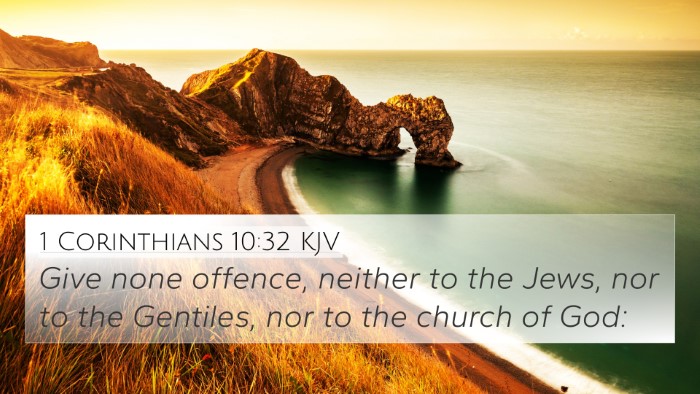
1 Corinthians 10:32 (KJV) »
Give none offence, neither to the Jews, nor to the Gentiles, nor to the church of God:
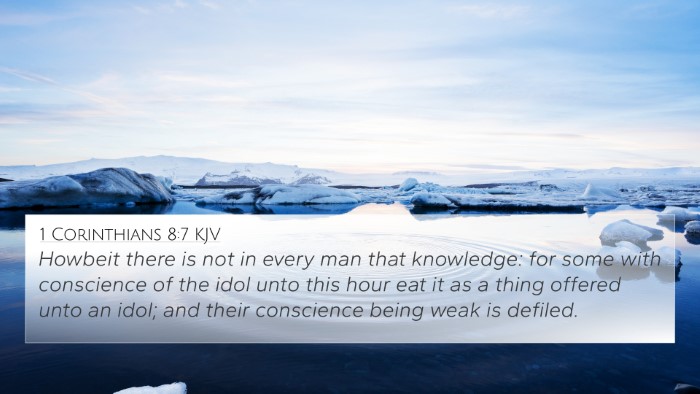
1 Corinthians 8:7 (KJV) »
Howbeit there is not in every man that knowledge: for some with conscience of the idol unto this hour eat it as a thing offered unto an idol; and their conscience being weak is defiled.
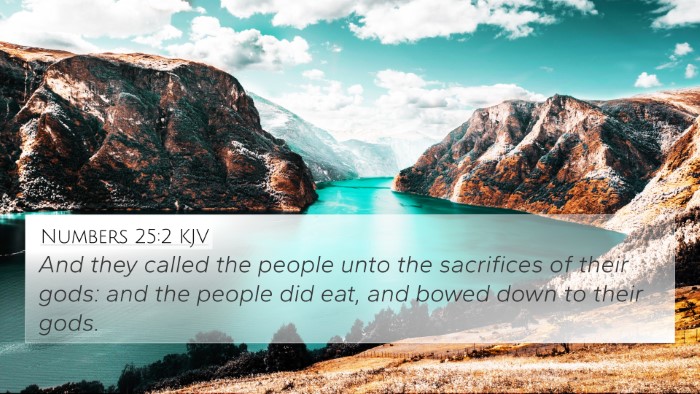
Numbers 25:2 (KJV) »
And they called the people unto the sacrifices of their gods: and the people did eat, and bowed down to their gods.
1 Corinthians 8:10 Verse Analysis and Similar Verses
Understanding 1 Corinthians 8:10
This verse states: "For if anyone sees you who have knowledge eating in an idol’s temple, will not the conscience of him who is weak be emboldened to eat those things offered to idols?" (1 Corinthians 8:10, NKJV).
Contextual Background
In this passage, the Apostle Paul addresses the issue of food offered to idols—a significant concern in the early church. The wealthier and more knowledgeable believers felt free to eat such food, as they understood that idols have no true existence. However, Paul highlights the potential spiritual danger to those with weaker consciences.
Commentary Insights
-
Matthew Henry:
Henry emphasizes that those who are knowledgeable must be cautious of their actions, as they could influence others who are not as certain in their understanding of liberty in Christ. He argues that love and consideration should guide behavior to avoid causing others to stumble.
-
Albert Barnes:
Barnes points out that even though knowledge is important, it should not lead to arrogance. The actions of the knowledgeable believer can lead the weaker one to go against their conscience, thus causing them spiritual harm. This illustrates the broader principle of considering the impact of one's freedom on the community.
-
Adam Clarke:
Clarke elaborates on the significance of the term ‘weak’ referring to individuals who lack the confidence or knowledge to partake in certain freedoms, particularly concerning idol worship. He notes that the idol's perceived influence over food is a stumbling block for these individuals and urges believers to exercise restraint for the sake of others.
Thematic Connections
This verse directly speaks to the theme of Christian liberty and responsibility within the community of believers. The overarching message is one of mutual consideration, love, and the responsibility that comes with knowledge.
Cross-References
- 1 Corinthians 10:23-24: Discusses the importance of focusing on the common good in all actions.
- Romans 14:13: Encourages believers not to judge one another, particularly in matters of personal conscience.
- Galatians 5:13: Highlights the call to serve one another in love, affirming the priority of love in exercising freedom.
- 1 Corinthians 8:1: Introduces the concept of knowledge, emphasizing that love is superior to knowledge in the Christian life.
- 1 Peter 2:16: Advises believers to live as free individuals but to use their freedom to honor God and not as a cover for wrongdoing.
- Philippians 2:4: Recommends looking out for the interests of others, reinforcing the need for consideration and empathy.
- Colossians 3:17: Encourages doing everything in the name of the Lord Jesus, which includes being mindful of the impact on others.
Practical Application
Believers are called to reflect on their actions, particularly regarding areas where they possess freedom but where that freedom may cause confusion or distress to others. Especially in matters of conscience, one should act with the mind of Christ, fostering unity rather than division.
Conclusion
The exhortation in 1 Corinthians 8:10 remains relevant to the church today. Engaging in a deeper study on inter-Biblical dialogue and thematic Bible verse connections enhances our understanding of Christian liberty and love. This passage invites believers to examine their relationships with one another critically, balancing knowledge with love to build up the body of Christ.
Related Study Tools
For those looking to deepen their understanding of Biblical texts more fully, consider utilizing:
- Bible concordance: A tool to find specific verses and their themes.
- Bible cross-reference guide: Assists in discovering related scriptures and themes.
- Cross-reference Bible study: A method for comprehensive study using interconnected scriptures.
- Bible reference resources: Materials that facilitate deeper dives into specific Biblical topics and verses.
Further Study Recommendations
As you continue your study, think about:
- Identifying connections between Old and New Testament teachings.
- How to find cross-references in the Bible for sermon preparation.
- Exploring comparative studies of Apostle Paul's epistles to hone your understanding of Christian principles.


